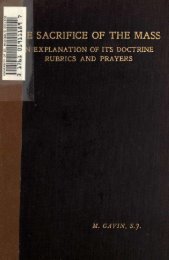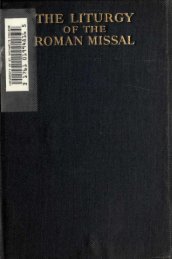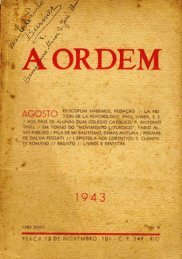E SACRIFICE OF THE MASS
E SACRIFICE OF THE MASS
E SACRIFICE OF THE MASS
You also want an ePaper? Increase the reach of your titles
YUMPU automatically turns print PDFs into web optimized ePapers that Google loves.
i86 APPENDIX.<br />
Solemn High Mass at St. Peter s. (See Dictionary of<br />
Christian Antiquities, by Cheetham and Smith, p. 1,016,<br />
London, 1875.)<br />
When, however,<br />
preached,<br />
Roman Christianity was first<br />
Latin was rapidly becoming the common<br />
tongue of a large portion of Western Europe.<br />
St. Augustine (353 430) in his City of God, tells us<br />
that Rome imposed her language on the subject-races.<br />
Latin was commonly spoken in the Roman colony of<br />
Africa, and St. Augustine says he learnt Latin in the<br />
nursery. Gaul and Spain after<br />
Rome adopted Latin, and the<br />
their subjugation by<br />
upper classes knew<br />
something<br />
of it even in distant Britain. The Roman<br />
officials are said to have spoken Latin throughout<br />
the Western Empire. There is no evidence of vernacular<br />
services in Britain or in Ireland, where St. Patrick<br />
(373 4^3) and his followers preached the Gospel. It<br />
is most natural to suppose that the missionaries would<br />
have employed the language familiar to them in the<br />
Liturgy of Rome. In a service so sacred as the Mass,<br />
where every word is of importance, the missionaries<br />
would naturally use the language in which its prayers<br />
were learnt by heart. For Mass in<br />
was probably said from memory.<br />
those early times<br />
The Canon was<br />
probably not written before the fifth century, and it is<br />
admitted that the Liturgies which bore the names of<br />
SS. Peter, James, and Mark, were not written by them.<br />
(Le Brun, Explication de la Messe, vol. ii.p. 14, Paris, 1726.)<br />
That the Latin of the Church s Liturgy was nof under-<br />
standed of the people," seems scarcely doubtful. If at<br />
this day in Italy the peasantry speak several dialects<br />
mutually unintelligible, is it likely that the Latin of<br />
Pope Leo I. (440 460), or Gregory the Great (590<br />
604), was understood by the uneducated classes? What






